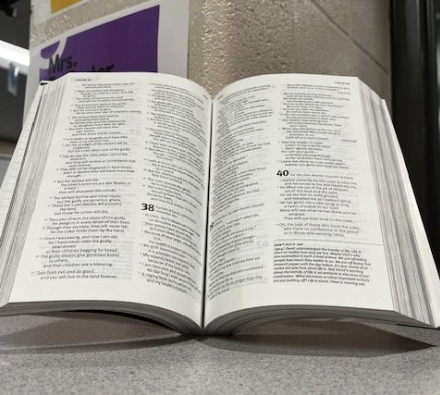Late Point Viewpoints
Teachers, students input on late points
Students are notorious for having late assignments, and teachers have to find ways to make sure material gets turned in on time. The policies implemented by teachers who give late points versus those who don’t are created for one main reason: to support students.
“I’ve never taken off late points for work since I’ve been in education simply because I feel like I’d rather them do the assignment and learn something than penalize them. I understand that other classes also have stuff and they have lives outside of school,” Hailey Bachura, social studies teacher, said.
When it comes to giving late points, overall structure is top priority for teachers and kids alike.
“It gives me more motivation. This is going to sound bad but having late work- I would say it helps with stress,” Riah Falkenrath, 9, said. “It gives me motivation to at least turn it in sometime just to get the points.”
Statistics from the National Department of Education show that 14.4 % of students in the Spring Hill School District are chronically absent. Effort combined with the constant rise of absences K-12 makes creating late policies a game of chance for teachers.
“I used to do one day 10%, two days 20% when I first started teaching. But a combination of just more and more late work, more and more absences, less and less ability to trust students to say it was one day, it was two days instead of ‘oh it wasn’t late at all,’” William Meier, science teacher, said.
Students are asked to be more and more accountable through their school years, and when dealing with school work they have to prioritize.
“Not having late points creates more of an opportunity for procrastination, but if a student has a problem with procrastination, this will happen regardless of late points existing,” Dylan Estes, 9, said. “It definitely allows me to explore the creative process more since I don’t have to stress about hitting a specific deadline.”
Even though teachers’ policies differ, there are some similarities when it comes to classwork.
“If I have an assignment due at one point, you can start it in the class and it’s not due until the following day at 11:59 in classroom. So that gives them class time to complete it, and then whatever they don’t complete is on them,” Bachura said.
Most create their late policies to teach more than just the material at hand.
“Understanding that it’s not just the knowledge, it’s the life skills and the ability to do things on time,” Meier said.
Life skills also come from extracurricular activities, which students have to work around from time to time. Nationally 83% of children ages six to 17 are involved in at least one extracurricular activity.
“Not having late points encourages you to turn in more quality work than rushing to get an assignment done. It can also reduce stress for students that are in extracurricular activities and don’t have enough time for quick turnaround in a class,” Estes said.
Assignment types and teachers’ varying class structures help support students’ ethics when working on tasks.
“It honestly depends on the class, because some classes revolve around notes and tests and others depend on reading and all that. But I would say it does differ, some just have different work policies and that’s it,” Falkenrath said.
No matter what ways of teaching, learning styles, or which policies are enforced, students and teachers thrive in their personalized environments.
“I think most, if not all, teachers are lifelong learners. The fact that kids are changing and education is changing faster than we as people change, you have to kind of adjust to the times,” Meier said. “Every teacher has their own line on that, and it’s nice enough to know that Spring Hill High School supports us in our individual classrooms.”









